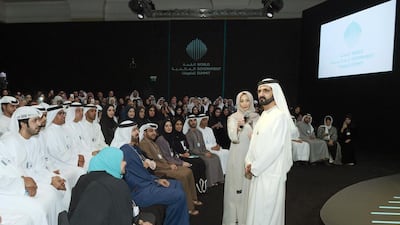Ministers have greeted the increased representation of female Government members – and the new posts of Happiness and Tolerance – as putting UAE governance ahead of the world.
New UAE ministers have welcomed the new posts of Happiness and Tolerance in the federal Government, and the increased representation of women.
“There is no nation that believes in their women more than the UAE and it shows,” said Noura Al Kaabi, the new Minister of FNC Affairs. “I know most of the women who are new members and they are worthy, and I think it is just great.”
The new Ministers of State for Happiness and Tolerance will set apart the UAE’s system of governance from “any other system”, Ms Al Kaabi said, adding there would be more focus on certain tasks of the ministers.
She said she had a big job to fill the shoes of her predecessor, Dr Anwar Gargash, who remains Minister of State for Foreign Affairs, but said she would do her best to make her post a success.
“My first reaction was a state of appreciation and a state of also nervousness,” she said. “It is a huge responsibility.”
But Sheikh Mohammed’s words that “we trust she will add great value” helped to show the relevance of her time as an FNC member since 2011, said Ms Al Kaabi.
“I am happy that I will be going and attending the sessions,” she said. “I have to admit it has been a short period of time with this current membership.”
After the recent parliamentary retreat for FNC members at Sir Bani Yas Island, Ms Al Kaabi said, she developed a clear vision of the council’s successes, challenges and what could be done to bring “the best sort of presentation”.
There, she said, Dr Amal Al Qubaisi, Speaker of the FNC, created a bond with the members.
“We talked about our strategy mission and the future, and it is a huge advantage that we sat and brainstormed and I was part of the process,” Ms Al Kaabi said.
Dr Maitha Al Shamsi, Minister of State in the old and new governments, said the women ministers were appointed “not because of a quota, but for qualifications”.
She believed Sheikha Lubna Al Qasimi would play a major role as Minister of State for Tolerance.
“The leaders would not have placed this job unless there is a regional and international need for this,” said Ms Al Shamsi.
The new types of posts in the Government reflects “an enlightenment for the future for many countries, and now tolerance is a major objective”, she said.
Hussain Al Hammadi, Minister of Education, said the appointment of two Ministers of State to support his role highlights the importance of the sector and “sets us in front of new requests which require precise work”.
The coming work will be based on honesty, strong will and ambition, he said, “to enable us to overcome obstacles” and achieve a competitive status that “supercedes its counterparts in developed countries”.
Jameela Al Muhairi, new Minister of State for Public Education, said her appointment inspired her “to exert greater efforts in serving this country. Together, we’ll build on the development goals highlighted in the national agenda while ensuring the happiness of our students”.
Sheikha Manal, daughter of Sheikh Mohammed bin Rashid, was delighted. “Congratulations to the UAE’s new Cabinet,” she tweeted. “Very proud that women account for 27.5 per cent of the Cabinet.”
hdajani@thenational.ae


